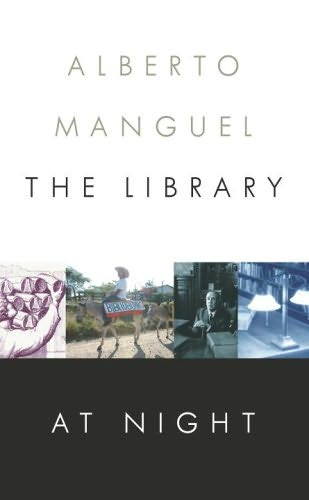
The Library at Night
Alberto Manguel
(Alfred A. Knopf Canada, Toronto: 2006)
READ: June - July 2008
This is a delightful book and I was sad to finish it (though largely unable to stop from compulsively reading it) and sadder still to send it back to the library from whence it came.*
Alberto Manguel is not a librarian, though he would make a marvelous one. He is a bibliophile, and knows his way around books and the written word so incredibly deeply and thoroughly. I can only hope to ever have a tiny fraction of the bookish worlds in his head. This book should be required reading for every first-year library school student. It is a wonderful tour of library history with stops at many interesting, quirky places along the way.
Some slices of my favourite parts:
- Talking about how early Arab libraries often divided books by subject rather than alphabetically (as most early Western libraries tended to do), Manguel tells us about the doctor Abou Ali El-Hossein Ibn Sina ("Avicenna") who discovered a library at the home of one of his patients in what is today's Uzbekistan. While the doctor's account deals mostly with the expert classification of the books, I was struck in particular by the doctor's description of the resident librarian as "keeper of the live memory of the books". How apt.
- His discussion of how the digitization of materials may, in fact, not be the saviour of our times is an interesting look at the other side of the coin. While slanted a little heavily toward the printed word - "As any reader knows, a printed page creates its own reading space, its own physical landscape in which the texture of the paper, the colour of the ink, the view of the whole ensemble acquire in the reader's hands specific meanings that lend tone and context to the words" - it is certainly enlightening in terms of helping us to question the attitude of complete and total reliance that we have taken toward electronic materials. As one good example, in 1986, the BBC undertook a massive project to digitize the Domesday Book, a census of England from the 11th century. As of March 2002, the digital copies could no longer be accessed on a computer (even on the original computers for which the discs had been made). The original paper copy, however, is still available and perfectly useable (though, granted, you have to go to Kew in Britain to see it). At the very least, these sorts of examples could be used to good effect in a library school debate on the subject.
- Manguel's admittance that his library is larger than what he will perhaps be able to read in his lifetime made me laugh, for my library, while undoubtedly infinitely smaller and not as broad-based, is fast taking on the same unmanageable nature. "I know that my books have unlimited patience," he writes. "They will wait for me till the end of my days." I love that. In a similar vein, he then goes on to discuss the decidedly odd Samuel Johnson, the 18th-century compiler of the infamous Dictionary of the English Language, who "thought it 'strange advice' to urge someone to finish a book once started. 'You may as well resolve that whatever men you happen to get acquainted with, you are to keep to them for life.'" While I try in most cases to finish the books I have started, I am not as wedded to that ideal as I once was. With so many good books out there, why waste time reading something you don't enjoy? There are always other books waiting.
But don't get me wrong: You don't need to be a librarian to enjoy this book (though it will certainly help!). You do, however, need to love books. I for one will be keeping my eyes open and will pick up a copy of this as soon as I can find it at one of my favourite second-hand bookshops. Because, like a good friend, it would be nice to have around.
* Having written this review a few months ago and then having forgotten to upload it to this site, I am happy to add that I have since bought my own copy.
No comments:
Post a Comment